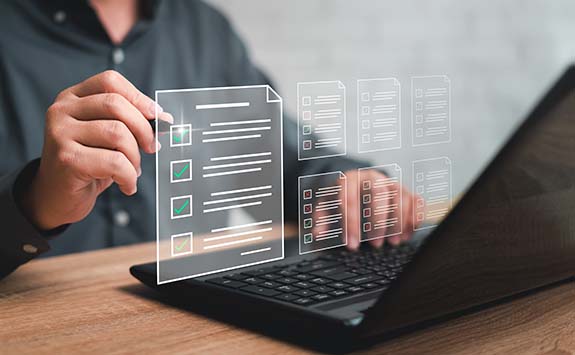Electronic Documents
Access and share your digitally certified qualifications online.
Newcastle University is now issuing electronic documents to students who graduated from July 2018 onwards.
All documents are issued via the Parchment platform (formerly known as Digitary), a secure and trusted provider of electronic documents.

Benefits of electronic documents
- securely share your verified qualifications directly with employers/other universities by the click of a few buttons
- completely free of charge
- lifelong, 24/7 immediate access to your documents from anywhere in the world
- view and manage your documents from one place
- fully compatible with mobile devices
- environmentally sustainable
Whether you are applying for jobs or seeking further study, many employers or universities will often need to verify your academic qualifications directly with the University. This can be a slow process due to the volume of requests and the need to seek student consent.
The provision of electronic documents significantly speeds up this process by enabling you to share your verified qualifications with third parties directly. You are in full control.
Documents provided
- Degree certificate – will be issued to all students (normally) during the month of graduation
- Higher Education Achievement Report (HEAR) – will be issued to UG/PGT students* (normally) during the month of graduation
An interim HEAR will be issued to UG students* following the end of each stage (i.e. July, or September for resit students).
(*Not available to students on the MBBS programme or UG programmes in the School of Dental Sciences – bespoke transcripts are available from your Faculty Office)
Accessing your electronic documents
All documents are issued via the Parchment portal (formerly known as Digitary). An email will be sent to your University email address to let you know when a document has been issued to you. (You may wish to add the following email to your list of trusted senders: noreply.nu.docs@newcastle.ac.uk).
Simply click on the link provided and follow the instructions.
Your login details are your University Gateway user ID and password (e.g. the same details that you use for email).
The first time that you log in you will be asked to register a personal email address with Parchment. This is because your University login details will expire shortly after you have left the University and you will therefore be unable to use these details to access and share your documents in the future.
If you have any problems please contact the NU Documents Team.
Security and authenticity
All documents are digitally signed using banking level security and are therefore authentic, tamper-evident and legally valid when viewed online.
Any documents viewed online via Parchment (formerly known as Digitary) are official secure and verified Newcastle University documents (i.e. further verification checks with the University are not required).
Parchment (formerly known as Digitary) guidance
For information on how to register for Parchment (formerly known as Digitary) and share your documents please see the Student Digitary Guidance.
Visit Parchment for further guidance on how to access, view and share your electronic documents.
Graduate access
Current students and recent graduates will be able to register using their University credentials and the instructions contained in the guidance above. However, once your University email access is closed off this will no longer be the case.
If you left Newcastle University from July 2018 onwards, and no longer have access to your email, please complete the Graduate Access Request Form. We will link your account to the personal email address provided and send registration instructions. This can take up to 5 working days.
If you already have a Parchment (formerly known as Digitary) account, please use the personal email address and password you set up whilst registering. To get a password reminder use the ‘Can’t Sign In’ link via Parchment. We are unable to reset your password once you register, but the link provides simple steps to allow you to do so.
If you graduated before July 2018 please see Documents for Former Students.
